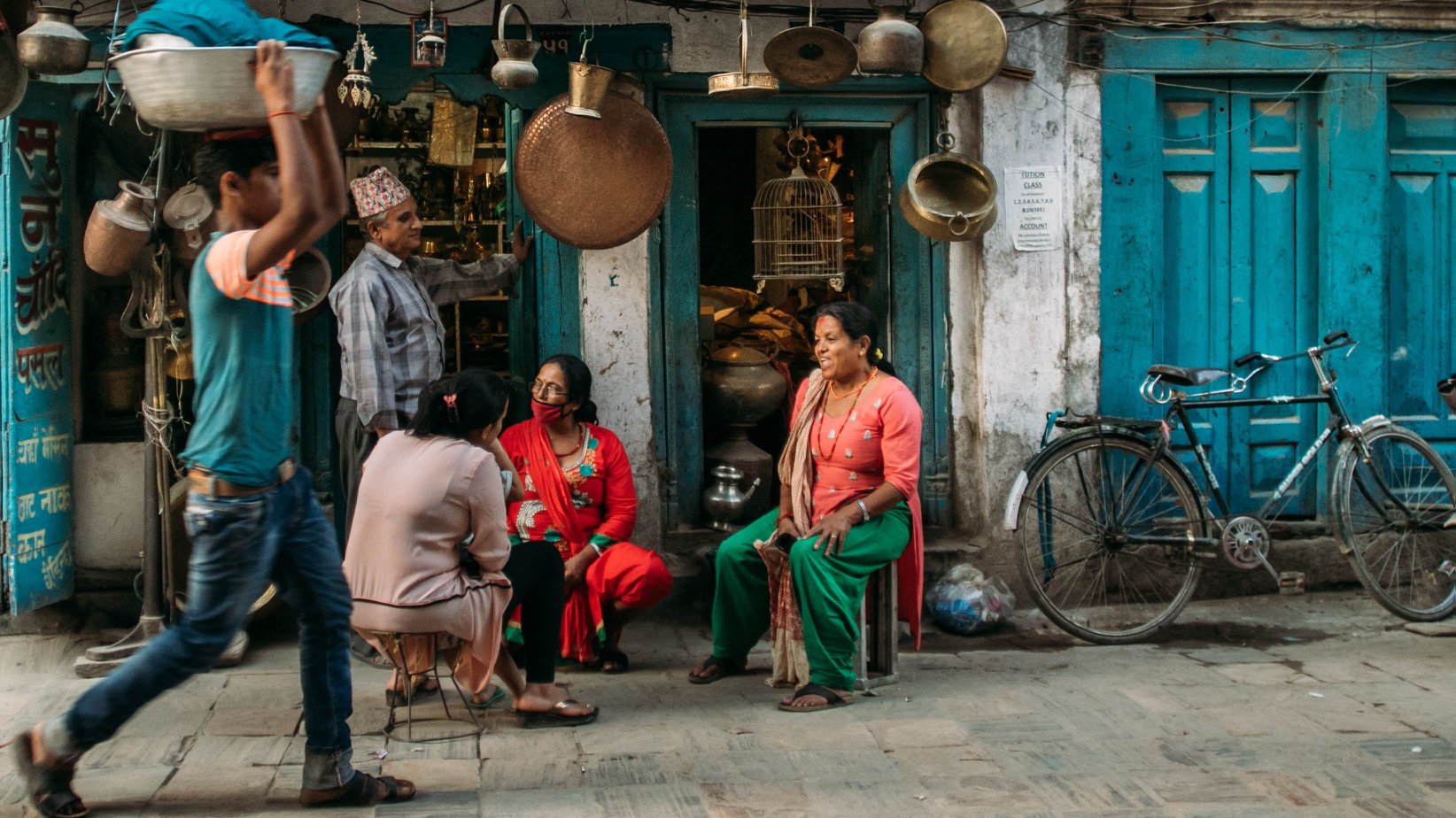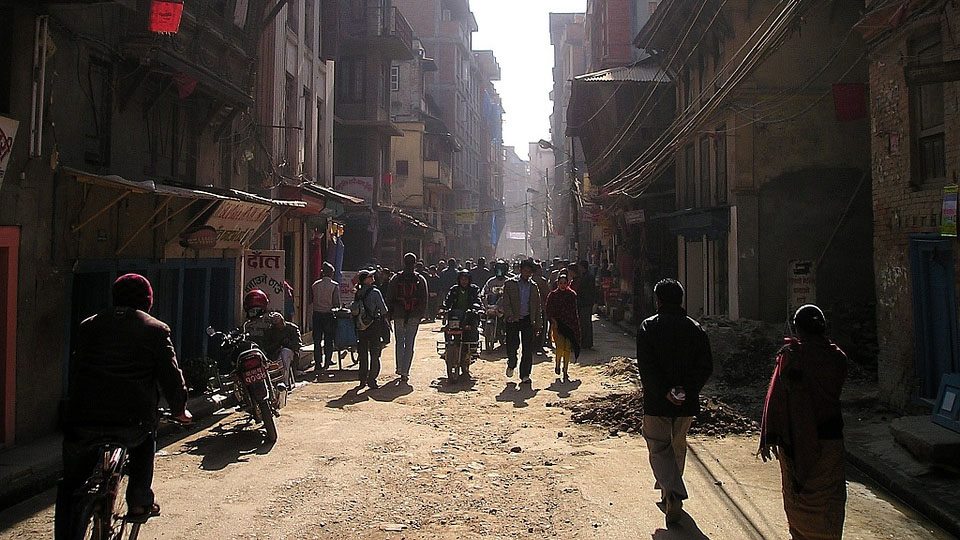Region / Country: South Asia
Among the pagodas
Sunset in the city of Yangon. A student gets off the crowded bus, weary after a day’s study at university. As always, it was a long journey back. She walks home from the bus stop past the crumbling colonial buildings and golden pagodas, lit up by the evening sun. Men meet in smoke-filled tea shops to chat about their days and their lives. Buddhist monks in long orange robes walk the streets. People with cream-smeared faces wander through the markets in search of colourful fabrics or food for the evening meal.
These are the streets of “The Golden Land”, otherwise known as Myanmar. This student is one of around 600,000 young people studying at university there. As she walks among the ancient pagodas, phone in hand, she looks the same as everyone else. But she’s not. She’s a Christian.

Photo by Harish Shivaraman on Unsplash
Living in the minority
The MFES movement is a lifeline for the few Christian students in Myanmar. It’s not easy living in the minority. “We have hardly any Christian friends at university”, one shares. “When they realise I don’t join in with their religious festivities, they look down on me”, says another. Aside from the feelings of isolation, these students also face practical challenges in finding a place and a time to meet together.
Though the country is becoming more open, there is still a wariness towards students in general, and towards Christian students in particular. Universities in Myanmar were at the centre of the civil unrest throughout the last century. Student protests often ended in bloodshed. For most of the 1990s, universities were completely closed. Military leaders saw university students as a threat to their authority and national stability. Urban universities have since been rebuilt – but outside the city centres where there is no accommodation. So students must travel long distances each day on poorly functioning transport. It takes up a huge amount of time.
On top of that, many students take extra tuition classes outside of university hours with the hope of finding a better job in the future or having the chance to study abroad. There’s little time for meeting with other believers. If it’s not a problem of finding time, it’s a problem of finding a place to meet. Government restrictions mean that MFES groups are not allowed to meet on campus.

Photo by Aaron Burden on Unsplash
A peace she didn’t have
But despite these challenges, the IFES movement in Myanmar is growing. For a long time, student work seemed impossible. But four years ago, MFES was started and today there are around 120 students involved in the ministry. Each week there are Bible studies (many led by students), prayer meetings, times of discipleship and outreach through language lessons. One student shared:
“We study the gospel carefully so that it might spread. We learn about how to form our own Bible study discussion groups. As we study the Bible in MFES, it is bearing lots of fruit.”
It is exciting to hear of students turning to Christ. But those who do so inevitably face huge challenges.
Maiah* is a third-year student from a Buddhist background. She had noticed a difference in the lives of her Christian friends. They had a peace she didn’t have. That’s why she started to look into the Christian faith. Recently she decided she wanted to follow Christ. Since then she’s been actively involved in an MFES Bible study group on campus. But Maiah hasn’t yet told her family. When they find out they are likely to punish her severely or even force her to leave the family.
The internet invasion
Students like Maiah desperately need support and encouragement from other Christians if they are to stand firm and speak gospel hope into their society. They need wisdom to live as Christ’s ambassadors on campus, in a country that has seen unprecedented change over the last decade.
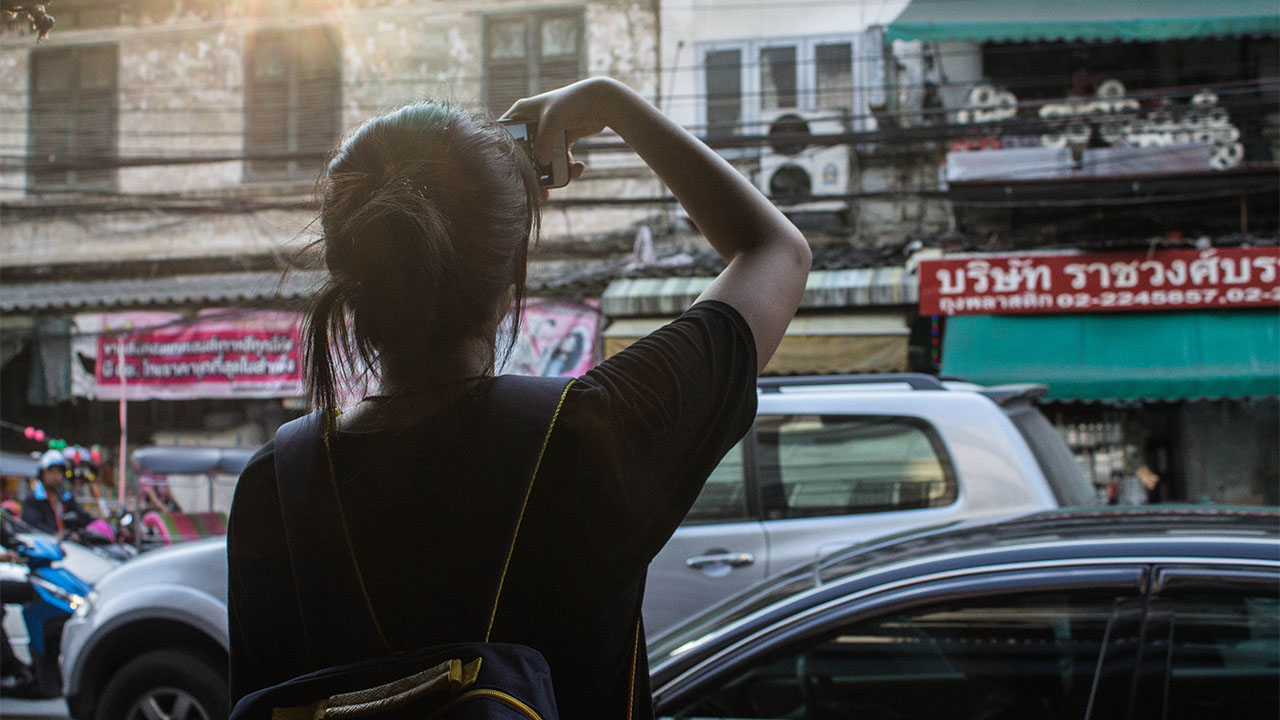
Photo by Wanaporn Yangsiri on Unsplash
Alongside the monks and monasteries is a new generation – a generation shaped as much by their mobile phones as by the traditional Buddhist culture. This is a nation in a time of rapid transition, coming face to face with a global world.
Myanmar has gone from having very little connection with the global world to full exposure to it. Just five years ago a sim card cost around $200. Today they are just $1.50. More than 90% of the country has access to a phone with internet connection. 60% use Facebook. Though there are obvious benefits to being online, the invasion of the internet has exposed the people to a host of seriously damaging social problems like pornography, social media obsession and discontentment.
Change and continuity in national identity
The internet has influenced the expectations of students. They have much bigger dreams for their lives than they used to. Young people are on the move, from villages to cities in search of better employment opportunities. There is a growing cultural gap between the older and younger generations. Older people in the villages are struggling to know how to help the young people with drug abuse, unhealthy internet habits and unwise relationships.
But one aspect of national identity that has not yet changed significantly is religious adherence. There are certain ethnic groups in Myanmar with higher proportions of Christians – the Karen, the Chin and the Kachin, for example. They make up the vast majority of the 2.5 million Christians in the country. But the predominant people group is the Bamar, numbering around 30 million. They are devout Buddhists. Only 0.1% follow Jesus. For them, ethnicity and religion are inseparable: to be Bamar is to be Buddhist.

A better hope
Christian students in Myanmar need to speak into this changing world, holding out a better hope. They need to show that allegiance to Jesus transcends ethnic identity. That new life with Jesus is better than a new life abroad or a higher-paid job. That the internet can be used in a way that honours God and enhances relationships. That bridges between generations and ethnic groups can be built. This is a high calling for a young movement in a sensitive context. One MFES staff worker asked us to pray for them:
“Please pray that God would use this ministry for Myanmar to know Him. Pray that God would use these young people living by the word of God in all the places they live. Pray that they would be people who hold fast to the gospel.”
* name changed
South Asia
From Myanmar to Nebraska
Alee first met Sha K’ Paw on 20 June — World Refugee Day. He was one of the volunteers, helping out amidst the good-natured chaos of the face-painting, soccer tournament and fashion show. The annual event in Omaha, USA always attracted big crowds, and that year was no exception. Alee, an InterVarsity staff worker, had the responsibility of coordinating the team of volunteers.
They hadn’t had many high school student volunteers in the past, so the fact that these young people were volunteering stood out to her. She got talking to two of them — Sha and his friend, Sunkist — both Karen refugees from Myanmar. It turned out that they were planning on going to the University of Nebraska Omaha (UNO) that fall. Alee’s ears pricked up! She’d met Karen children before, but she’d never met Karen students going to college. They chatted away. And then she took a stab in the dark: “Are you two followers of Jesus?”
Sha K’ Paw
Sha K’ Paw was born in Myanmar, a country in South Asia marked by a long, devastating civil war. At the age of seven he moved to a refugee camp in Thailand, where he stayed for six years, without his parents. It was a simple life: every day Sha went to school, played with his friends and ate rice with mung bean soup. His dormitory was run by Christians who taught the children to read the Bible and pray every morning and evening.

At 12, Sha moved to the US with his aunt in search of a better life, and was suddenly plunged into a totally different world: the culture, the language, the people — everything was different. He writes:
“I had heard people tell stories about what ‘third countries’ (countries where the refugees settle) are like. I’d heard they have a lot of food, great education, freedom and opportunity. And when I got to the US, I found the stories were true: the country was full of great things. But there were struggles too. I no longer had to worry about my empty stomach, but I had to worry about eating too much. I no longer had to worry about war, but I couldn’t speak English, and I struggled with school and understanding the culture. I no longer had to live in fear, but I still worried about my future.
As a teenager, I looked back and I could see how God had led me safely through life. There had been moments in my life when I’d felt alone and abandoned — but God had been there with me. There had been moments when I’d wanted to quit — but God had strengthened me. Realising deeply how He had been a Father and Saviour to me all along, I accepted Him as my Lord and Saviour, without doubt or question. I was baptised on 5 March 2011, at the age of 15.”
An answer to prayer
As all staff workers know, meeting Christian high school students about to go to university is a golden opportunity. All you need to get is their number, and you can plug them straight into a fellowship group before they’ve even set foot on campus.
But Alee met Sha around the time that her InterVarsity staff team had been praying about reaching every corner of the campus. They’d been reflecting on the way that each person reached is connected to a network or people group. With those prayers in mind, Alee realised the opportunity in front of her. Release, not recruit. That was what InterVarsity student ministry was all about. These two young Christians could be added into an existing, thriving fellowship group at UNO. Or they could be empowered and equipped to start their own, reaching out to other Karen refugees. It was a no-brainer.
Mookatah
After meeting Alee at the World Refugee Day, Sha and a few of his friends were connected to the staff workers at UNO. They bonded over mookatah (Thai grill) and after arriving at UNO as freshers, started studying the Bible together. Sha and a few others were discipled, and it wasn’t long before they were leading the Bible studies themselves and telling their friends about Jesus: “My friends need to know that Jesus loves them; someone needs to help them know that, and I guess that person is me.”
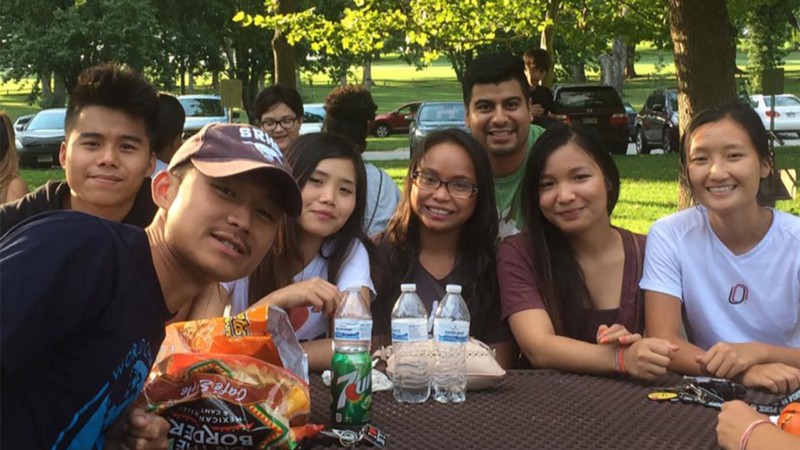
The group grew, as more Karen students heard about the fellowship group and joined in. Sha reflects on that time of growth:
“I continued to grow little by little as I was learning and leading at the same time. A group of us also prayed about God’s mission on our campus and we saw growth over the past year. It was the investment of our staff workers in us that helped us grow, and of course the Holy Spirit who led us.”
God’s faithfulness for pilgrim people
Almost all of the Karen students are the first in their families to study in the US. Most, like Sha, grew up in refugee camps before moving to America. They arrived with little or no English. Their parents would have had even less. It was up to the children to help their parents adapt to the new culture, act as interpreters, go to the bank, read the mail. The pressures of being displaced are all-too familiar for these young people.
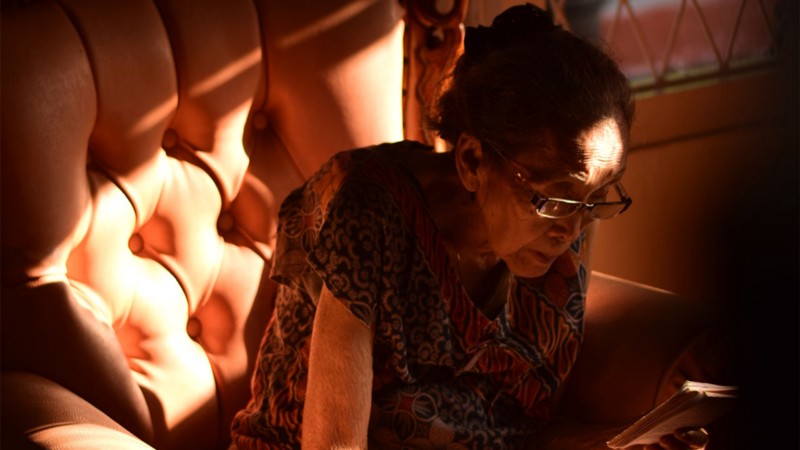
The group of around 25–30 refugee students at UNO have been studying the book of Exodus, learning from the story of God’s displaced people. Having seen the faithfulness of God in the Bible and in their own stories of suffering, the students want others to know Him too. Some of them have even started reaching out to other refugee communities around them. One student, Manger, said:
“I am encouraged by my experience as a former refugee and a first-generation college student. I experienced God’s love throughout my life and I want to share it with others. I want to see revival in my community — at church, at home and at school.”
It is amazing to see how a casual conversation at a community event a few years ago has grown into a thriving student ministry. But this story is as challenging as it is encouraging. Are we, like Alee, praying for opportunities to reach new corners of the campus? How many more unengaged networks could be reached this year if more of us adopted the release, not recruit mentality? Are we looking to share the faithfulness of God with those around us?
From the classroom to the fields: finding time for fellowship when days are long
It’s 3pm; classes are over. But for local university students in Haryana, north India, there’s no time to relax. The weary students pack up their books and jump on the bus. It winds its way further into the countryside, taking them past acre after acre of paddy fields. For the next few hours the students must tend their family’s plantation. Watering, weeding, sowing, harvesting, looking after the buffalo. It’s gruelling and laborious work.
The state has 47 universities, with perhaps two or three known Christians on some of the campuses. It’s hard for them to find time to meet. The ongoing demands of the fields make evening Bible studies impossible. Lunchtimes are the only chance they get to study the Bible themselves or share it with friends. Despite these challenges, students are turning to Christ.
UESI India staff-worker Rampal was one of those. He heard the gospel as a student 17 years ago. Rampal is now finishing his theological studies and will return to the same area to share the good news with Hindu students next year.
Please join us in praying for the students of Haryana:
- Pray that Christian students would continue to grow spiritually and have meaningful fellowship, despite having limited free time.
- Pray for Rampal and the rest of the small staff team to persevere in discipling students faithfully and sharing the gospel.
- Pray that Hindu students in Haryana seek and turn to Christ this year.
For 40 years, UESI India staff, graduates and students have been making the costly decision to move north to share the gospel with students. Read more.
Thanks for praying with us!
Moving north
It would have been easier to stay in the south. That was their home. Same culture, same language. Lots of Christian friends. But Sathish and his wife Mini decided to move to the north of India, to a state where only 0.001% of people knew Jesus.
Their new home was in Haryana, the second floor of a two-storey house. It was a friendly neighbourhood. During Hindu festivals their quiet street would turn into an impressive spectacle of noise and colour and dancing, as people emerged from their houses in bright, colourful clothes to celebrate together. Their neighbours had never met Christians before and were curious about this young couple from the south. Why had they come all this way to live here?
A challenging start
They had come to reach out to university students. That was their intention at least.
But doing so was not going to be straightforward. For one thing, they couldn’t speak the local language. They had no formal lessons; only three years of slowly picking it up from patient friends, one word at a time. In the shops they would point to what they wanted to buy: ‘this thing’, ‘that thing’, was all they could say.
Another huge barrier was the students’ lack of free time. As soon as class was over, the local students would all leave campus and go directly to their family’s fields to work. The only opportunity to spend time with them was during their 45-minute lunch-break each day. Countless hours would be spent on buses, travelling between universities to catch snippets of time with students. It was a slow and challenging start.

Meeting Rampal
But then Sathish met Rampal. He was an ordinary village boy. A student at university, who, like many of his peers, had never left Haryana. He’d never seen the mountains of India; he’d never seen the big cities. But he was curious to know more about this person of Jesus. What did He say? What did He do? How did Jesus compare to other gurus he’d heard about?
Sathish and Rampal read the Bible together each week, and after two years, Rampal gave his life to Christ. He proved to be a key first disciple. Ever Wednesday lunchtime, Rampal would bring his friends along to meet with Sathish, and together they would open the Bible. Over time, several professed faith. Once they returned home however, many fell away. Their decision to follow Christ would disappoint their whole family, and sometimes the opposition was too strong.
Worshipping the wrong god
Rampal faced opposition from family too. He was the first and only believer from his village, and his Hindu family did not approve of this ‘western religion’. It was not easy to go against their wishes — and indeed against the wishes of his whole community.
One Tuesday night, his village had gathered together to sing Bhajan — songs to Hindu gods. Rampal was getting ready for bed and heard the singing. It suddenly occurred to him: “They are not doing the right thing. They are worshiping a god who’s not God.” So he took his Bible, went to find them and told them the message of the gospel.
“We’ve been worshipping these gods for ages, but what change has it brought to our lives?” he said. “The God of the Bible is the real God.”
It didn’t go down well. They thought he was out of his mind. But over the following three years, several families in that village turned to the Lord because of Rampal’s witness.
Rampal is now studying at Bible college and will return to continue as a UESI staff-worker in Haryana next year.

UESI tentmakers move north
Rampal is not the only one making the decision to work in the north.
UESI has a thriving graduate ministry. For 40 years, they have been challenging graduates to consider moving north as ‘tent-makers’, to live and work among Hindu communities. It’s estimated that in recent years over 200 people and their families have done so. Initially they are viewed with some suspicion, facing questions like: Why are you coming here? Are you missionaries? How many people have you converted?
Job-hunting is also not easy. It’s often a matter of moving there and just finding any job they can. Over time they can build trust and look for a job that better suits their skills and interests. These mission-minded graduates gather once a year for a ‘tent-makers’ conference, to encourage each other through the ups and downs of life in the north.

Student missionaries move north
The call to move north is made to students as well as workers. They call them ‘student missionaries’. 100 student missionaries, mostly post-graduates, joined universities in the north in the last 3–4 years, intentionally moving to campuses where there is no Christian student witness.
One engineering student from the south, Asha, got admitted to a university in the north to do her Masters degree. Rather reluctantly, she went. She started to invest in the UESI group there, and through her involvement the group grew. Realising the opportunity, she had to make a difference as a committed Christian, she then chose to apply for a PhD course at another northern university. Asha’s since taken up the leadership of that UESI group.
Student missionaries don’t have it easy. Usually they go without their parent’s approval or financial support. They’re dependent on UESI graduates to pray for them and fund their studies, but even then, money is tight and having food each day is not guaranteed.
Not in vain
For now at least, the cost of moving north remains high, for students, tent-makers and staff-workers. It’s easy to get discouraged when faced with opposition or indifference. The ground is hard. Just sowing seeds is a struggle. Please pray with us that Sathish, Rampal, Asha and others would persevere, knowing that their prayers and witness are not in vain. Pray that revival would come to the north of India.
Working among the unreached
Every city in the world needs Christians committed to living out the gospel. But the overwhelming majority of graduates end up living in a city where there are already many Christians and thriving churches, while millions of unreached people continue to live beyond the reach of the gospel. Staggeringly, a third of the world’s population are still living outside the reach of a church.
Some graduates have prayerfully and proactively chosen to live and work in places where they can bring God’s light to those living in darkness. Read on to meet graduates who have done just that.

East Asia: A new direction
After graduating Sophie* landed the job of her dreams. But before long she started to feel uncomfortable. She felt that her job mattered more to her than Jesus. And it didn’t satisfy.
A few months later Sophie heard about a short-term mission trip taking Bibles in to a country in East Asia. It struck a chord with her. She’d always loved exploring new countries and cultures, and she signed up to go. But she didn’t expect those two weeks to have quite such a significant impact on the direction of her life.
Fast-forward one year and Sophie is now preparing to go back for the second time. This time she’ll stay for at least two months. She’ll be working with a Christian organisation doing a job that encompasses her skills, experience and passions: nursing, food research and environmental sustainability, all in one.
Sophie leaves a lot behind. And it’s a dangerous place for Christians to live. Is it really worth it?
“Yes, it’s worth it, because Jesus is worth it”, Sophie says. “I’m very conscious of how much the Lord has done for me. I have no reason not to trust Him. He’s always provided for me. And this opportunity seems tailor-made for me!”
Would it not be easier just to go back to the job of her dreams?
“The world tells you to get the best job you can. And I did that at first, but it didn’t satisfy. The only thing I want now is to seek first God’s kingdom and righteousness.”
*name changed

Moldova: Bringing hope home
In Moldova, around four out of five graduates move abroad in search of a well-paid job and a better quality of life. But Tanya didn’t. After completing her Masters studies in mathematics, Tanya and her husband (who was working as a policeman) felt that God was calling them to go back to their village to live and work.
They said goodbye to their comfortable city life and moved back to the village. No running water. No sanitation system. No heating during the cold winter months.
Tanya started working as a maths teacher in a high school. She got involved in the lives of the pupils there. They were needy. Some of them were living with alcoholic parents. Others were being brought up by grandparents or other relatives.
Tanya began to pray for them. After class she’d talk to them, give them attention, encourage them and show them the love they were lacking.
Tanya and her local church now help children from socially vulnerable families every week. They organise activities through which they can share the gospel, and they help them with their homework.
Praise the Lord for such graduates, who were missionaries amongst students during their student days, and now have chosen to take the gospel back to their villages.

South Asia: Bringing Jesus to places where He is not yet known
After graduating, my church went through the journey of Paul’s life. As I sat there every Sunday, I was challenged. Paul’s life was far from comfortable. A life truly following Jesus is not meant to be centred on comfort and worldly security. But at that time, my life was heading in that direction; it challenged me and made me uneasy.
So when I graduated about four years ago, my husband and I decided to move to a mega-city in South Asia. We started a company to raise health awareness. We see ourselves as business owners who love Jesus.
For us, our business is both our work and our ministry. We work eight hours every day alongside our employees who don’t know Jesus. Daily, we are faced with challenges of cultural misunderstandings, corruption and fraud. Our employees see how we face these challenges with God, and when they see Jesus in us, it is life-changing.
Families and friends are not always supportive. It seems crazy to them for us to leave behind a good job and home. And that can be tough. But when life gets hard, I look around me: most of my local friends here live close to poverty and desperately need to know of the freedom of life in Christ. Our Father sees this and He is calling out for disciples to go to these nations. We consider it such a privilege and an adventure to partner with God to bring Jesus to places where He is not yet known.
Ireland: Being intentional in the workplace
When I heard the local hair salon was advertising for a junior stylist, I decided to apply. It wasn’t a great career move. I could have earned more money working for a big chain. But my church had a real heart for reaching out to the community, and I thought this would be a good way to meet local people.
As I started the new job I wanted to see the salon as my mission field. I wanted the way I worked and the way I spoke to point my clients and colleagues to Jesus.

In my hometown, when you go to get your hair cut you’ll always be asked the same questions: why are you getting your hair done? Are you going somewhere nice tonight? But I wanted to really get to know people, so I tried to stay away from those dead-end questions. I would ask things like, ‘How’s your week been going?’ or ‘What have you been up to today?’ Then I’d try to remember to ask about those things the next time they came in.
I found it hard at first. But I’ve become a bit more comfortable with taking risks in conversation. The way I talk about what’s happening in the news, or what I did at the weekend — those can be opportunities to speak about Jesus. Maybe they’ll think I’m weird — but maybe they’ll ask questions and want to know more.
Moving strategically
In our increasingly globalised world, taking the gospel to the nations doesn’t necessarily mean going overseas. Universities are places where the nations are coming to us in vast numbers. Are there international students in your classroom or dormitory that you could get to know better?
And as you prepare to graduate, why not prayerfully consider moving strategically to a gospel-starved country or city or village? Could you use your degree and skills in a place where most people don’t yet know Jesus? Could you do business, teach in a school, work in a hospital or do further education in an unreached place?
It might not be easy, but, as Sophie says, it’s worth it.
Hungry at home
How many Bibles do you own? Can you remember where you keep them?
Maybe one or two. They’re probably sitting on your bookshelf, or next to your bed. Easy enough to find. But not in Chidananda’s house. And not in Poorani’s.
They’re from devout Hindu families. When they became Christians, they had to hide their faith. And their Bibles.
Persecution looks different in different countries, cultures and contexts. For these two Christians in India, persecution happened at home. Read their stories below. Pray for them. And praise God that they considered Jesus worth suffering for.
Chidananda; UESI India alumnus
“Initially I didn’t reveal my faith to my family because of fear. I used to read the Bible secretly at home or sometimes I would go 90 minutes early to college to read the Bible.
But my uncle came to know about my faith in Jesus, and he was furious with me. He forced me to stop my studies and he took me home. He had me beaten up and warned me strongly not to go to church or read the Bible. He shaved my head and wanted me cleansed from all religious impurity. I did not retaliate or speak a single word against him. I silently submitted to him because God had prepared me well in advance of this situation through his Word.
God spoke to me through Romans 8: 38, 39:
“For I am convinced that neither death nor life, neither angels nor demons, neither the present nor the future, nor any powers, neither height nor depth, nor anything else in all creation, will be able to separate us from the love of God that is in Christ Jesus our Lord.” (NIV)
That verse gave me strength. And in my quiet time, God spoke through 2 Timothy 1:8 and 3:12:
“…join with me in suffering for the gospel, by the power of God.” (NIV)
“In fact, everyone who wants to live a godly life in Christ Jesus will be persecuted…” (NIV)
So I believed that these things don’t happen without God’s knowledge!
I started praying about the situation and our staff workers prayed for me fervently as well. God assured me through the Bible. And my uncle actually changed his heart and sent me back to college.
These trials helped me to grow more in my faith in the Lord. God gave me confidence that my family will be transformed one day. Please pray for my family to know my Jesus.”

Poorani; PhD student; UESI India
“My father died in a road accident when I was three years old and my brother was two. My mother accepted Christ shortly after that. We lived with our maternal grandparents, who followed Hindu rituals and customs devoutly. Without telling her parents, my mother would take us to church. Yet there were times when she would be beaten by her parents for doing so.
I knew that as Christians we were not to bow before other gods. That wasn’t easy though. When my mum went to work, my brother and I would be under the care of our grandparents. They used to tell us that we could only eat if we worshipped their idols and put the white and red tilak on our foreheads. So there were days when my brother and I were hungry at home the whole day.
Even though my mum was an engineering student, she didn’t have a permanent job. Her siblings were in good government jobs, so her parents accused her saying that it was because she was a Christian that she was less successful. As grandchildren, we were always compared with our cousins. If we got just one mark less than them in exams they would start comparing our God with their so-called gods.
We didn’t have the freedom to carry a Bible to church or have one at home; we couldn’t sing at home or pray. Sometimes we would pray in bathrooms. If my grandfather found a Bible at home he would tear it up and burn it immediately.
During my 7th class my grandparents sent our family out of their house. Everyone thought life would get worse for us. But even though no one was there for us, God was with us. That year we had the freedom to have a Bible at home and carry a Bible to church without fear. We could sing and pray freely at home.
My grandparents still compare me with my cousins because my cousins are younger than me but are married already. I’m 27 years old and still single. Now whenever we meet any of our relatives, they always talk about my marriage. They suggest finding men from a non-believing background and pressurise me to agree. And again, they tell us that it’s because we became Christians that I’m not yet married. It’s a big challenge for us to face. But we know that God is in control and knows the plans He has for us.”
Praise God for such faith in the face of on-going persecution. And pray with us that God would continue to strengthen his people and grow his church across South Asia, despite severe opposition.
All ten of the countries in the IFES South Asia region appear in the Open Doors World Watch List. In eight of those countries, the level of persecution is considered ‘very high’ or ‘extreme’.
Our brothers and sisters in South Asia need our prayers.
When student rites of passage get abusive
I don’t remember a lot of those first six months of university. I try not to. It’s too painful.
But some of it I can’t forget. I remember starting to panic as the senior students made their way down the row towards me, demanding that each of us sing or dance in front of the class. I remember the humiliating onslaught of verbal abuse after I neglected to salute them on one occasion. I remember the painful sting of injustice I felt when we were forced to clean their toilets and wash their clothes night after night. I remember the feeling of dread that they’d do to me what I’d heard they’d done to others.
Those were bitter months indeed. I often considered dropping out. Even when I slept my tormentors would visit me in my dreams.
And yet my biggest regret is not the abuse I experienced as a freshman. It’s the abuse I carried out on the new freshmen the following year.
It never occurred to me to do otherwise. That was just the way it was. How else would we gain the respect we deserve? As seniors, it was our right and responsibility to keep them in their place. And how else would they build friendships with each other? Their shared suffering would make for stronger solidarity. It was for their own good. (Or so I told myself at the time.)
Ragging
This kind of experience is not a one-off. In many South Asian universities, these initiation activities imposed on freshmen are known as ‘ragging’. Mild ragging might include being told to conform to a set dress code or allow senior students to go before you in the queue. In more extreme cases of ragging, students might be forced to do chores or embarrassing performances; some experience verbal, physical and even sexual abuse by seniors. It can last a few months or even up to two years. But the scars last much longer.
Seniors maintain that ragging builds unity among the freshers, and friendships with seniors. It’s also seen as a way to ‘equalise’ newcomers — those from different financial and ethnic backgrounds are treated alike. For a few, it’s a light-hearted rite of passage into university life. For many, it’s a degrading and damaging ordeal.
Yet the phenomenon is not easy to stop. Ragging has been an engrained part of university life for decades. And the behaviour is symptomatic of much deeper issues intrinsic to the worldview of the society. Addressing both the behaviour (often covert) and the underlying issues will not be an easy battle.
But that didn’t stop one Christian law graduate from trying.
A man with a vision
Sanjayan is young. He’s been teaching at a university for only a year. But he has a vision to see ragging in Sri Lanka become history.
A year ago, he embarked on a mission to bring ragging to an end in the law department of his university. He knew that merely punishing the behaviour of the perpetrators would only cause it to go more underground, and possibly worsen. The underlying attitudes and the unmet needs fuelling it would need to be addressed first.
To undermine ragging at its foundations, Sanjayan promoted three key ideas among his colleagues and in his interactions with students: that force is not necessary to build unity, respect and friendship; that an alternative program must not be forced; and that the relationship between seniors and juniors should be based on mutual respect, rather than dominance and control.
He emphasised that staff must be willing to question themselves as well. Were they modelling a right use of their own authority? In a society where the forceful pursuit of dominance is widespread and expected, could the students see a distinctive attitude in their lecturers? Were they showing a genuine concern for student welfare, beyond simply the phenomenon of ragging?
A better way
Sanjayan knew it would take time. Probably years.
He started by encouraging students to consider there could be an alternative way to build unity, respect and solidarity. Those were good goals to have, but could be achieved by caring for the freshmen, rather than terrorising them. Treating them well would win their respect and gratitude in a better way. These seniors could leave a legacy as the cohort that brought lasting change to the university.
And Sanjayan prayed. Some days he would ask God for an opportunity to speak to the students of influence in the class — and then opportunities would indeed arise! And at critical stages of the six-month period or before crucial meetings he would ask a group of prayer supporters to pray with him. They knew that God alone could do the work of transforming students’ hearts.
They weren’t all easily convinced, but after an extensive time of consulting with student leaders, listening to them and casting his vision for a better alternative, the students decided to make some changes as the new freshmen arrived at the start of 2018.
The second years planned an alternative orientation program, that aimed to build unity and friendship through fun activities and games like a sack race and egg catching, without the humiliation or abuse of typical ragging. The welcome party (after which point ragging is meant to stop) was brought forward to the fourth week of term. There was an inter-year debate put on, as well as seminars to help students settle in and present tips on learning English.
These initiatives were largely successful and helped seniors to see that force was not the only way to build community and earn respect.
Incremental steps
But it didn’t all go well.
Despite the efforts of staff to monitor university spaces during the first few weeks, some ragging did still happen — particularly off-campus, and among certain ethnic groups.
And there were some battles Sanjayan and the department decided not to fight this year. The enforced dress code was one of them (seniors told fresher boys not to wear trainers or jeans, and to be cleanly shaven until the welcome party; girls were told to wear skirts and tie their hair in plaits). Phone ragging was another battle left unfought (where seniors contact prospective entrants and force them to ring them and carry out various tasks before they enter university).
There was certainly progress, but not as much as they’d hoped for.
Why is it so hard to see change? Sanjayan reflected:
“It’s like they feel that it is a threat to their identity as seniors if juniors don’t listen to them. To achieve long-term change, we need to help seniors come to a place where they are secure enough in themselves to accept this kind of behaviour and not get worked up by it. I don’t think we can assume that they are mature enough to do this on their own — perhaps they should be, but everything in our culture militates against it. There are many reasons — it is a loss of face for seniors; it is a threat to their power and control; it is contrary to everything they know.”
Prophets of a future not our own
2018 did see considerable progress within this one department, in this one university, but there is still a long way to go.
Sanjayan expects that if a concerted effort is maintained they will, in perhaps five years’ time, bring the activities to an end.
Sanjayan is praying that God will raise up a batch of students who have the courage and imagination to refuse to pass on the harm to which they were subjected.
In moments of discouragement this year, the words from Ken Untener’s poem spurred him on:
It may be incomplete, but it is a beginning, a step
Along the way, an opportunity for the Lord’s grace to
Enter and do the rest.
We may never see the end results, but that is the
Difference between the master builder and the worker.
We are workers, not master builders;
Ministers, not messiahs.
We are prophets of a future not our own.
From Prophets of a Future Not Our Own
Pray for student groups in Nepal
Students leaders of NBCBS Nepal have been gathering regularly throughout the year for training in how to lead inductive Bible studies. It’s been making a big impact.
For many of the students the training has given them the confidence they lacked in opening the Bible with others. One student Saru shared:
“As I’ve put the inductive Bible study methods into practice, my student Bible study group has become more excited to know more about the Bible. It’s helped me to engage people in the group.”
Six to nine students come regularly to Saru’s Bible study group. Students are commenting that they’ve never studied the Bible before with such interest and depth.
The training is also an opportunity to encourage each other through the struggles of being a Christian student in Nepal. Increasingly the Christian faith is being ridiculed by lecturers and mocked by fellow students. In the face of apathy, pluralistic attitudes, nominal Christianity and legal restrictions, sharing the gospel is very difficult indeed.
Please pray with us for students in Nepal.
- Pray that students would be keen opening the Bible together each week.
- Pray that the members of Saru’s Bible study, as well as other Christian students, would be living distinctive and godly lives on campus.
Thanks for praying with us!



